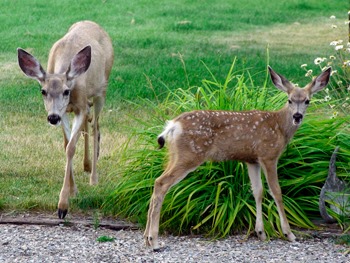With the approach of deer fawning season, WildsafeBC is reminding the public to leave any baby deer they see alone.
WildsafeBC said doe will often leave their fawns on their own for hours at a time, returning through the day to nurse their young.
Roussy added that baby deer do not have a scent while they still have their spots, to help them hide from predators. Moving fawn from where you find it can also greatly reduce its chance of survival.
“Be aware that the mother knows exactly where she left her fawn,” said Danica Roussy, WildsafeBC Community coordinator for Cranbrook and Kimberley. “If you pick up and move that fawn, which we’ve had incidents of in Cranbrook, it will become lost, confused and potentially abandoned because that human scent is now on the fawn and the doe doesn’t know where her fawn is.”
Residents are asked to stick to marked trails and keep their pets close by during fawning season, which generally runs from May to June.
“If you do see a deer, give them a wide berth and keep your dog on a leash and under control,” said Roussy.
WildsafeBC said deer may attack if they perceive a threat to their young.
“Does may see pets as predators or threats to their newborns since dogs are members of the canid family and are the natural predators of fawns in the wild. If a dog comes too close, the doe may become aggressive and attack,” said WildsafeBC.
Deer will typically give several warnings before they attack.
“Warning number one would be the deer laying its ears back and lowering its head, and warning number two is a stomp of the hoof,” explained Roussey. “If a deer indicates that it is going to attack you and your pet, just avoid eye contact, speak softly, and back away slowly.”
In the event of a deer attack, there are several things you can to try to keep yourself safe.
“Try to stay up straight and cover your head with your arms and then move to shelter as quickly as possible. If you’re concerned for your safety or you see a deer in your neighbourhood that aren’t afraid of people and is acting aggressive towards people and pets, just call the conservation officer service (COS).”
The COS RAPP line can be reached at 1-877-952-7277.




